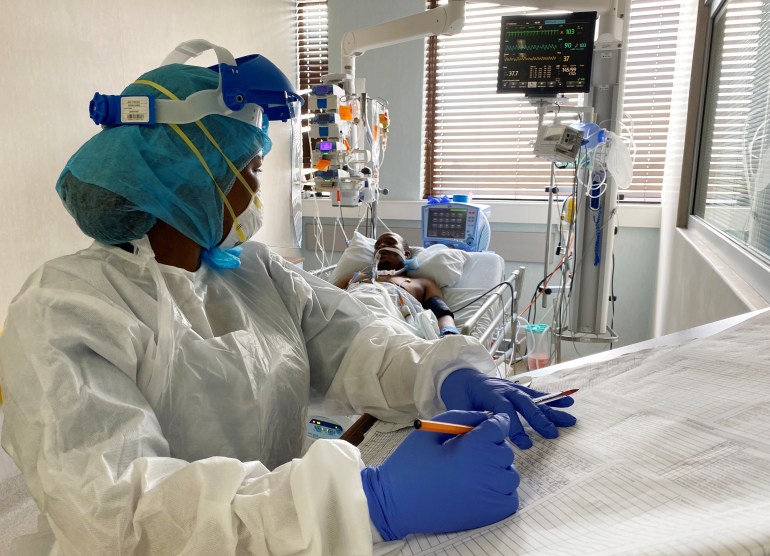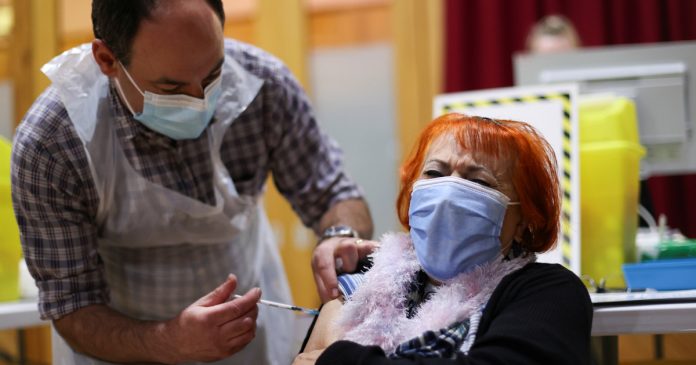[ad_1]
At about the same time the first vaccines against COVID-19 were being approved and acquired in December 2020, health officials in the United Kingdom announced the discovery of a new strain of the virus.
Initial reports based on limited early evidence suggested that it could be more infectious. A few days later, the discovery of another variant of the coronavirus was announced in South Africa, which at the time was recording more than 15,000 cases of COVID-19 infections daily, the highest number in Africa.
And in January another variant was detected in Brazil, originating in the northern state of Amazonas.
According to Dr Deepti Gurdasani, a clinical epidemiologist and senior lecturer at Queen Mary University of London, a variant called D641G developed in February-March last year in the Chinese city of Wuhan, the location where the first known case of COVID-19 was confirmed in December 2019.
“That variant was associated with about 20-30 percent increase of transmissibility that rapidly became the dominant variant in the world,” Gurdasani told Al Jazeera.
“This highlights the potential of this virus to adapt.”
But let’s start at the beginning.
What is a variant?
Variants are mutations of a virus. All viruses mutate when they copy themselves in order to spread and thrive. Most mutations are insignificant, some can actually harm the virus, and others can produce a variant that will make it more transmittable.
To break it down further, a mutation is a change in the genetic material of the virus – or what is called the ribonucleic acid (RNA).
A virus spreads inside the body by attaching to a cell, then entering it. They then make copies of their RNA, which helps them proliferate. If there is a copying mistake, the RNA gets changed and that is what scientists call a mutation.
Brooke Nichols, an assistant professor at the Boston University School of Public Health, said mutations occur much more frequently with RNA viruses because the RNA “has no ‘proofreading’ capacity and, as such, cannot correct the mistakes that are made during viral replication”.
“This can then become problematic when the virus then selects for mutations that allows for the virus to replicate more efficiently,” Nichols told Al Jazeera.
“For example, if a person has been previously infected, then the virus may select for mutations that can evade that previous immunity, or select for mutations that allow for the virus to be more transmissible.”
How do variants affect humans?
The coronavirus disease has undergone several mutations since the beginning of the pandemic.
All three variants detected in the UK, South Africa and Brazil have undergone changes to their spike protein. This is the part of the virus that attaches to human cells and makes it better at infecting cells and spreading.
Although scientists agree the mutations found in the three variants make the coronavirus more infectious, there is no evidence these actually aggravate the disease or are more likely to cause death.
“The variants do not appear to make the coronavirus disease more deadly,” Nichols said. “The variants do, however, make the virus more transmissible. This could mean that more people can become infected more rapidly- and thus still overburdening healthcare systems.”
B.1.1.7
On December 14, UK health officials reported a new variant to the World Health Organization (WHO).
The variant, called B117, was first detected in September in Kent, southeast of England. By December the strain accounted for 60 percent of new COVID-19 cases in the UK, becoming the most common version of the coronavirus in the country.
While preliminary evidence suggests the variant may be up to 30 percent deadlier than the previous dominant strain, experts say the data is limited and there is still not much information to determine how infectious it is.
It was initially reported the variant could be up to 70 percent more transmissible, but the latest research by Public Health England puts it between 30-50 percent.
Early research appears to show vaccines are effective against this variant. Last week, the Novavax and Johnson & Johnson trials showed they were 86 percent and 66 percent effective, respectively.
In late January, scientists said that trials showed the Moderna vaccine appeared to work against the variant.
The UK strain has been detected in more than 50 other countries, including China, India, and the United States
Recently, experts said the variant has a mutation that is present in the South African variant – the E484K, which is thought to help the virus evade parts of the immune system and antibodies.
B1351
 A medical staff attends to a COVID-19 patient at a special ward at Arwyp Medical Centre as South Africa reached the milestone of one million infections [File: Shafiek Tassiem/Reuters]
A medical staff attends to a COVID-19 patient at a special ward at Arwyp Medical Centre as South Africa reached the milestone of one million infections [File: Shafiek Tassiem/Reuters]
Days after the new variant was announced in the UK, South African authorities said on December 18 a new variant was rapidly spreading in Eastern Cape, Western Cape, and KwaZulu-Natal.
The B1351 variant first emerged in the country in October and has since become South Africa’s dominant coronavirus strain.
The variant has also been found in 32 other countries, including the UK.
Research showed the variant also has the E484K mutation, as well as the N501Y mutation – which appears to make it more transmissable.
Recent trials have shown some vaccines to be less effective against this variant than others.
The vaccine developed by AstraZeneca and the University of Oxford appeared to offer only limited protection, the British-Swedish drugmaker said.
Novavax said preliminary data from clinical trials showed its vaccine was 60 percent effective. Johnson & Johnson said clinincal trials carried out in South Africa showed its vaccine to be 57 percent effective at stopping moderate to severe cases of COVID-19. Both of these vaccines have yet to be approved by regulators.
On January 25, Moderna, whose vaccine is being rolled out around the world, said it was developing a booster shot after it found its vaccine was less effective against the South Africa variant. It is currently testing whether a third booster shot might be beneficial.
B11248
 The variant of the coronavirus detected in Japan originating in the Brazilian state of Amazonas is already dominant in its capital Manaus, reinforcing initial suspicions it may be more contagious [Marcio James/AFP]
The variant of the coronavirus detected in Japan originating in the Brazilian state of Amazonas is already dominant in its capital Manaus, reinforcing initial suspicions it may be more contagious [Marcio James/AFP]
In the middle of January, a separate new variant was discovered in passengers arriving in Japan from Brazil.
The origins of the B11248 variant were traced back to the northern Brazilian state of Amazonas where it was first detected in its capital Manaus in December.
It also has the E484K mutation.
“What we know it has independent and shared mutations with both the UK and South Africa variant,” Dr Deepti Gurdasani said.
This particular variant is concerning “because in the laboratory it has been associated with significantly reduced neutralisation from antibodies directed at previous variants”, she continued.
During the first wave of the virus in Brazil last year, 76 percent of people in Manaus were exposed to it.
“But we are still seeing huge waves of infections and it is very unclear at this point in time as to why that is,” Gurdasani said. “It could be because we are dealing with a new variant so it is more transmissible which increases the herd immunity threshold. But it could also be that this variant escapes at least for some people the immune response to the previous variant.”
The variant was present in 51 percent of samples taken from coronavirus patients in December, he said. By mid-January, it appeared in 91 percent of samples.
Scientists do not understand why the variant has spread so explosively in Brazil and why it carries a particularly dangerous set of mutations.
Will vaccines work on the new strains?
Mutations help the virus evade antibodies or escape recognition by them.
However, vaccines train the immune system to attack several different parts of the virus. That is, the antibodies of the vaccines target many parts of the spike protein, so even though a part of the spike has mutated, the vaccines should still offer a degree of protection.
On January 27, Pfizer said its vaccine was slightly less effective against the UK and South African variants.
Even in the worst-case scenario vaccines that use mRNA technology, such as the Pfizer-BioNTech and Moderna vaccines, can be redesigned and tweaked to be a better match in a matter of weeks or months, if necessary, medical experts say.
[ad_2]
Source link











